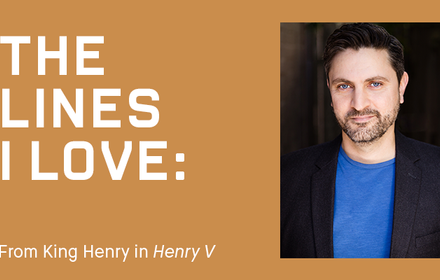
General
The Lines I Love Part 2
7 May 2025


The political hostility in Shakespeare's Coriolanus makes Australian politics look like a teddy bear's picnic. Compiled by Andy McLean.
The story of Coriolanus in five simple steps
Coriolanus is Shakespeare’s most political play, so it helps to know who the different groups and factions are. Here’s a quick rundown:
Patricians The privileged upper class who rule Rome via the Senate.
Plebeians The common citizens of Rome who are ravaged by food shortages and are demanding change.
Tribunes Early in the play, the tribunes are elected to represent the views of plebeians in the Senate.
Romans While they are divided on many issues, the above groups are united by one thing: they are all Romans.
Volsces Rome’s neighbouring people. Their society broadly mirrors Roman structures, including having their own Senate. Also like the Romans, the Volsces deeply admire military heroism and prowess. The Volscian army is in a constant state of war with the Romans.
Coriolanus Early on, the formidable Roman warrior Caius Martius is awarded the title ‘Coriolanus’. Reared from birth to be a fearless fighting machine, he shows contempt for the general public and has zero interest in their approval. (Still loves his mum, though.)
Volumnia The OG tiger mum, Volumnia is the go-getting, manipulative mother of Coriolanus. Fiercely patriotic, Volumnia values honour above all else—and basks in her son’s reflected glory.
Virgilia Loyal wife of Coriolanus who is (understandably) worried sick about his wellbeing. Her young son Martius dreams of emulating his father (and is training himself by playing with swords and torturing insects).
Tullus Aufidius Coriolanus’ arch nemesis, Aufidius is a Volscian military general who loathes Rome and everything it stands for. Like Coriolanus, he’s a skilled warrior and the two have fought many times. Unlike Coriolanus, he has some political nous too.
Menenius Agrippa Wily Roman aristocrat who is tight with Coriolanus. Skilled in the art of persuasion, Menenius effortlessly flits between the masses and the upper echelons of society.
Sicinius Velutus and Junius Brutus Masters of spin, Sicinius and Brutus are tribunes who represent the views of common people in the Roman Senate. Quietly working in the shadows to bring down Coriolanus.
Servants to Aufidius Feeble-minded and excitable, the kitchen staff love a good gossip.
Coriolanus is a political tragedy, a family tragedy, and a personal tragedy all wrapped up in one play. It’s no wonder scholars, actors, and directors keep returning to it. Here’s what the experts say.
‘It’s a play that shows so plainly how politics works and hurts; how states struggle to get along with their neighbours and themselves; and how in the end, we yearn for good society, yet are condemned to class inequity, shameful self-interest and blissful ignorance of our individual shortcomings. All of which produce real harm and self-harm. As my teenage daughter might put it, “We suck at society”.'
—Professor Liam E. Semler, editor of the Arden Shakespeare Coriolanus: A Critical Reader
‘The play represents a drawing back from the intensity of the earlier tragedies, but there is no denying the fierce artistic input, and it has found many advocates in modern times. Bertold Brecht’s brilliant analysis of the opening scene’s class divisions … underlines the key element of class struggle that was present in the Jacobean original.’
—Michael Wood, In Search Of Shakespeare
‘The most agreeable of the patricians is Menenius, a bon vivant and wheeler-dealer; a power broker, a numbers man and kingmaker—a figure not unfamiliar in Australian politics.’
—John Bell, On Shakespeare
[On Coriolanus and Aufidius] ‘…after Coriolanus has defected to the enemy camp, Shakespeare causes Aufidius to clasp his former adversary in a warm embrace and to address him in terms loaded with homoerotic implications. Though the lines include an assertion of heterosexuality in their reference to Coriolanus’ wife, Virgilia, it is impossible not to take them as an expression of a passionately homoerotic attraction at least on the part of Coriolanus to Aufidius.’
—Stanley Wells, Shakespeare, Sex, & Love
‘When Aufidius attacks Coriolanus and calls him a “boy of tears” the effect is devastating, not only because it is insulting but because underneath it there is a truth. Caius Martius Coriolanus in the end is a mummy’s boy. He is childlike, naïve in his belief that he can march over to the other side in a fit of pique and—for no genuine principle, out of hurt pride—prosecute a war on his own people.’
—Greg Doran My Shakespeare: A Director’s Journey through the First Folio
[On Volumnia’s ambitions for her son Coriolanus] ‘It’s all about competing and winning and coming home with the laurels. You wouldn’t want her at the school sports day, would you? He probably always had to win the egg and spoon race.’
—Dame Judi Dench Shakespeare: The Man Who Pays the Rent
The Coriolanus script is stacked with killer lines. Here’s just a few:
Go get you home, you fragments!
(Caius Martius/Coriolanus)
He is a lion
That I am proud to hunt.
(Caius Martius/Coriolanus)
If we and Caius Martius chance to meet,
‘Tis sworn between us we shall ever strike
Till one can do no more.
(Aufidius)
Had I a dozen sons, each in my love alike and none less dear than thine and my good Martius, I had rather had eleven die nobly for their country than one voluptuously surfeit out of action.
(Volumnia)
Nature teaches beasts to know their friends.
(Sicinius)
O, he is wounded, I thank the gods for ’t.
(Volumnia)
Every gash was an enemy’s grave.
(Menenius)
More of your conversation would infect my brain.
(Menenius)
What is the city but the people?
(Sicinius)
His nature is too noble for the world.
He would not flatter Neptune for his trident,
Or Jove for ’s power to thunder.
(Menenius)
Action is eloquence
(Volumnia)
There is a world elsewhere.
(Coriolanus)
So our virtues
Lie in th’ interpretation of the time
(Aufidius)
My rage is gone
And I am struck with sorrow.
(Aufidius)